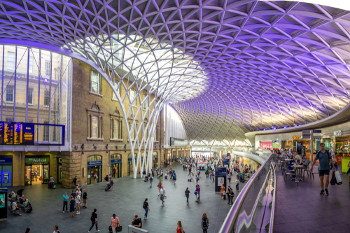‘We live in a time of great change’ has become something of a cliché over the past few years. It’s usually heard when discussing politics and technology, but for those of us looking ahead at the next few decades for Britain’s railway, we know the same applies.
It is undeniable that as a partnership of the public and private sectors, the railway has delivered significant benefits for customers and the country over the past two decades. Passenger numbers have more than doubled since 1997/98, reducing congestion on roads; an annual operating deficit of £2bn has been cut by three quarters, saving taxpayers £1.5bn a year; and the fleet is growing faster than at any time in over a decade.
However, we also know that the railway is facing tough challenges. We run one of the most congested railways in Europe and as we introduce more trains on the track to meet demand, the smallest delay can have a huge ripple effect across the network. The fares structure is also not fit for purpose, born from regulations well past their sell-by-date; and the current franchising model has come under increasing strain.
Sidestepping the more obvious Dylan and Gandhi quotes, Tolstoy once said that: ‘Everyone thinks of changing the world, but no one thinks of changing himself.’ We have long argued that if rail is to continue delivering for customers, communities and the economy, we need to critically examine how it operates, how it’s organised and how it can change to meet these challenges.
That’s why in the summer of 2018, we called on the Government to launch an independent review.
The Williams Review offers a once-in-a-generation opportunity to reboot our railway and it must not be missed. Our submission in April outlined building blocks for a new partnership railway that would make rail services more responsive to changing customer needs, more agile in integrating new technology and enable decision makers to tailor rail for customers across the country.
The railway is made up from very different markets, including mass commuting into our cities, longer distance business and leisure travel and connections between more rural communities. We need different forms of contract for these markets so that businesses are aligned locally and able to focus on delivering what matters for those customers.

Kings Cross station, London
And the railway is also a network. So these building blocks of a new system should be overseen and organised by a new, independent arms-length body to ensure that all the different parts are working in concert to deliver a better service for passengers and that people have a clear line of accountability for their rail services. This new railway must be underpinned by reform to the complex and inflexible system of rail fares.
Our proposals to overhaul fares were submitted to the Williams Review in February after we conducted the biggest ever consultation on rail fares with independent passenger watchdog Transport Focus. After examining almost 20,000 responses we drew up a blueprint for change based on what passengers and businesses want to see from a reformed system.
It would open the door to tap-in-tap-out payment across the country with price caps, season tickets which better reflect flexible working patterns and a best fare guarantee so that customers know they are getting the best price for their ticket every time.
Even on the most important issue facing the planet, the climate emergency, root and branch reform of the fares structure can play a role in helping the UK reach net zero carbon emissions. Research by KPMG shows that offering a better range of walk-up fares and smoothing out the cliff-edge between peak and off-peak prices could encourage an extra 300 million rail journeys over the next decade.
The average carbon offset of this could be the equivalent of removing 61,000 cars from Britain’s roads, 400 transatlantic flights, or planting a new forest twice the size of Manchester. Whatever ends up in the final recommendations stemming from the Williams Review, fares reform is essential.
Now is the time to deliver once-in-a-generation reform. While the Williams Review is expected to report before the end of the year, rail companies are keeping busy, continuing to deliver benefits for our customers today with the largest programme of improvements since the Victorian era. We’re unveiling brand new stations, rolling out 7,000 new carriages and hundreds more refurbished like new.
We’ve introduced over 3,000 new services over the past two years with even more on the way. This means more frequent and more comfortable journeys and with customer satisfaction on the railway as high as it has been since 2012, these improvements - which customers can see and touch - are already having an impact.
However, we know that greater organisational and systematic reform is required to enable the railway to make the contribution to the country that is should during this ‘time of great change’. We stand ready to play our part and we will continue to push for the radical reform our customers want and our country needs.
Paul Plummer is the CEO of the Rail Delivery Group, which represents train companies and Network Rail.
Register now for full access
Register just once to get unrestricted, real-time coverage of the issues and challenges facing UK transport and highways engineers.
Full website content includes the latest news, exclusive commentary from leading industry figures and detailed topical analysis of the highways, transportation, environment and place-shaping sectors.
Use the link below to register your details for full, free access.
Already a registered? Login